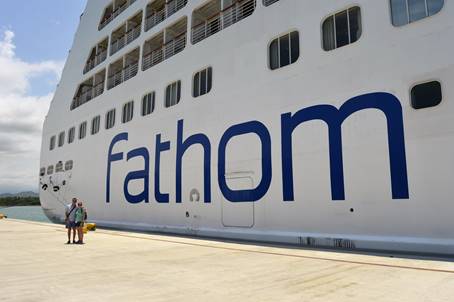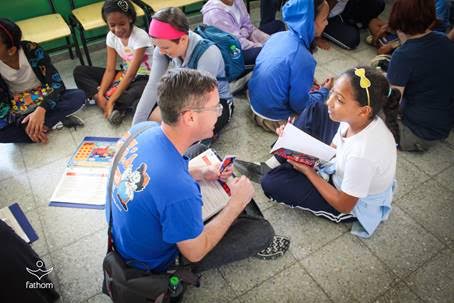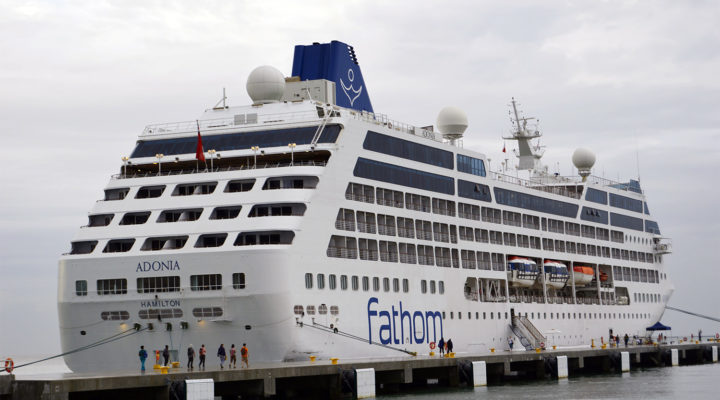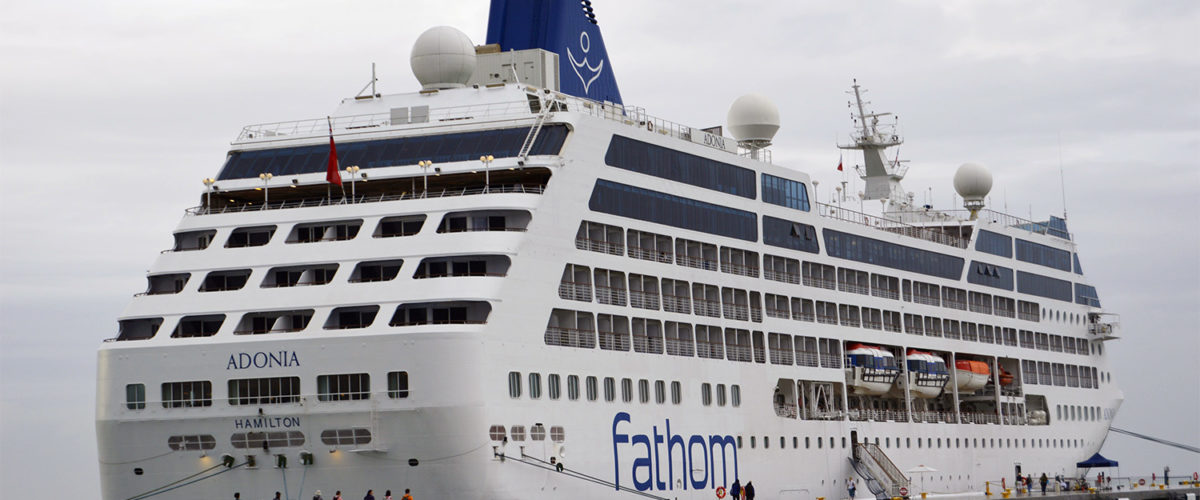It was just supposed to be a cruise to celebrate 15 years of marriage, see some of the Dominican Republic and even do a little service work, Tony Lankford recalls.
Lankford, senior pastor at First Baptist Church in St. Simons Island, Ga., and his wife, Tiffany, had signed up for the inaugural “impact travel” voyage called Fathom. They were to spend two days at sea aboard the MV Adonia and the rest of the week in the D.R.
They knew that volunteer work was involved, he says, but didn’t know how much.
“We did not go for some big mission experience,” Lankford adds. “We figured we would go and celebrate our anniversary.”
They did celebrate that anniversary during the late-April getaway. But the service part of the cruise was much more than they had anticipated.

Tony and Tiffany Lankford stand beside MV Adonia during the Fathom cruise to the Dominican Republic. Tony Lankford, the pastor of First Baptist Church in St. Simons Island, Ga., said the service-oriented cruise changed his outlook on missions. (Photo/Tony Lankford)
“What we didn’t expect was to have such a shaping and formative experience while we were there,” he says. “As a pastor, there is a ton I can learn about what Fathom is doing.”
One thing, Fathom is making global headlines on its current cruise to Cuba. The Adonia, which is a member of the Carnival Corp. fleet, tied up in Havana this week — the first cruise ship to do so in decades.
Online, Fathom said the 704-passenger ship will also make port calls at Cienfuegos and Santiago de Cuba during the ongoing cruise. In Cuba, passengers are offered cultural immersion tours that emphasize direct contact with Cubans, the company has said.
Travel that matters
When it isn’t on seven-day cruises to Cuba, Adonia will be on weeklong trips to the Dominican Republic for trips that are more service oriented.
“Join us,” the Fathom website’s D.R. sign-up page says. “And help us transform the future of families and communities for generations to come.”
The depth of the service work dawned on Lankford when the ship got underway and passengers were treated to a series of videos and courses on topics ranging from Dominican heritage and culture to social norms, customs and language.
There was also a course on growing the next generation of change-makers, he said. Every cabin contained a copy of Aaron Hurst’s book The Purpose Economy: How Your Desire for Impact, Personal Growth and Community is Changing the World.
“Fathom did a great job of education,” Lankford says. “I felt introduced to the people I was going to meet … you really got a sense of who they are.”
The education continued once the passengers went ashore.
They were treated to a range of volunteer activities to choose from. They could tutor students in English and teach it to adults. They could help under-employed and unemployed residents with entrepreneurial projects. They could work in reforestation and environmental education. They could help provide clean water access — and more.
“You can choose up to six activities or just do one,” Lankford says.
That was for the entire five days ashore. At night, they dined and slept aboard the ship.
Fostering impact
The Fathom concept originated with customers, says Ted Howes, the cruise brand’s director of product and experience.
“This is actually what the market was asking for — people are looking to have impact when they travel.”
More research revealed that younger generations of travelers not only want to make a difference when they travel, but throughout their lives, he adds.
That revelation inspired Fathom to provide the education and training passengers need to be of service not only for an ongoing cruise, but throughout their lives.

Tony Lankford tutors a student in the Dominican Republic during the Fathom cruise in late April. Lankford is a Baptist pastor who said he has been inspired by the week-long volunteer trip to the island nation. (Photo/courtesy of Tony Lankford)
Passengers also learn time-management and storytelling ” abilities that will aid in future service work.
“So the trip doesn’t end when you come back from the D.R.,” Howes says.
While the Fathom cruises are not operated from a religious standpoint, Howes says they are designed so that people of faith can bring their spirituality to the table if desired.
Likewise, those with no faith background also feel comfortable on the cruises.
“We are trying to create a community of travelers who work alongside locals to have impact and foster further impact.”
Consumers vs. producers
Participating in volunteer work outside of a Christian context turned out to be a game-changer, Lankford says.
“We worked alongside people of all kinds of faith understandings — and of no faith understanding. We worked with young and old, black and white and gay and straight.”
The projects were especially meaningful, he says, because he was free to make it about being Christ.
“For my wife and I, being Christian in a diversity of people was tremendously inspiring and it became a Christian mission … for us in ways we didn’t expect.”
Lankford has been inspired to further study and emulate, where he can, the Fathom model of channeling the growing desire of young people to serve.
The cruise was a reminder to stop conceiving of potential church members as consumers and designing services and ministries for their consumption, Lankford says. Instead, the focus of the church needs to be on people as producers who want to put their talents to use for others.
It’s the kind of model that other research and experience has shown is already helping churches find their niche in society.
“The church should not cater to consumers … but to their desire to produce — and Fathom has done that,” he says.


